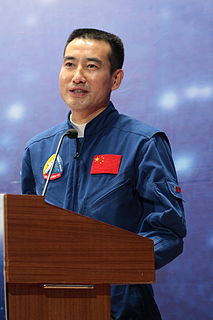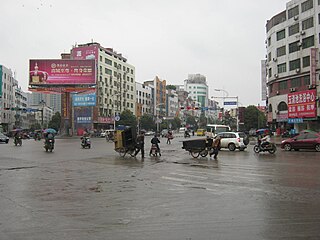
Extravehicular activity (EVA) is any activity done by an astronaut or cosmonaut outside a spacecraft beyond the Earth's appreciable atmosphere. The term most commonly applies to a spacewalk made outside a craft orbiting Earth. On March 18, 1965, Alexei Leonov became the first human to perform a spacewalk, exiting the capsule during the Voskhod 2 mission for 12 minutes and 9 seconds. The term also applied to lunar surface exploration performed by six pairs of American astronauts in the Apollo program from 1969 to 1972. On July 21, 1969, Neil Armstrong became the first human to perform a moonwalk, outside his lunar lander on Apollo 11 for 2 hours and 31 minutes. On the last three Moon missions astronauts also performed deep-space EVAs on the return to Earth, to retrieve film canisters from the outside of the spacecraft. Astronauts Pete Conrad, Joseph Kerwin, and Paul Weitz also used EVA in 1973 to repair launch damage to Skylab, the United States' first space station.

An apsara, also spelled as apsaras, is a type of female spirit of the clouds and waters in Hindu and Buddhist culture. They figure prominently in the sculpture, dance, literature and painting of many South Asian and Southeast Asian cultures.

Liu Boming is a Chinese pilot selected as part of the Shenzhou program. A fighter pilot in the People's Liberation Army Air Force, he was selected to be an CNSA member in 1998.

Shenzhou 7 was the third human spaceflight mission of the Chinese space program. The mission, which included the first Chinese extra-vehicular activity (EVA) carried out by crew members Zhai Zhigang and Liu Boming, marked the commencement of the second phase of the Chinese government's Project 921.

Zhai Zhigang is a major general in the People's Liberation Army Air Force and a CNSA astronaut. During the Shenzhou 7 mission in 2008, he became the first Chinese citizen to carry out a spacewalk.

Leiyang is a county-level city and the third most populous county-level division in Hunan Province, China. Leiyang is under the administration of the prefecture-level city of Hengyang. Located on the south of the province, the city is bordered to the north by Hengnan County, to the west by Changning City, to the south by Guiyang and Yongxing counties, to the east by Anren County. Leiyang City covers 2,656 km2 (1,025 sq mi) with registered population of 1,413,913 and resident population of 1,150,241. The city has six subdistricts, 19 towns and five townships under its jurisdiction, the government seat is Caizichi Subdistrict (蔡子池街道).
Sun Li, also known as Susan Sun, is a Chinese actress. She is hailed by critics and netizens as China's "Queen of Television". In 2018, she became the youngest Chinese actress to win the "Grand Slam", after winning the three biggest awards, the Flying Apsaras Awards, Golden Eagle Awards and the Magnolia Awards.

A Feitian space suit is a Chinese spacesuit that was developed for the Shenzhou 7. Astronaut Zhai Zhigang wore it during China's first-ever extra-vehicular activity (EVA) on 27 September 2008.

The Leiyang West railway station is a railway station in Leiyang, Hunan, China. It is operated by Guangzhou Railway Group Co. Ltd. on the Wuhan–Guangzhou High-Speed Railway. It opened in 2009.
Ma Lan is a Chinese performing artist of Huangmei opera who usually plays dan (female) roles. Before her abrupt departure from the stage in 2000, Ma Lan was considered the most popular Huangmei opera performer in the country. She has won the Plum Blossom Award, the China TV Golden Eagle Award, and the Flying Apsaras Award, and performed on CCTV New Year's Gala in 1984, 1987, 1988, 1992, 1997, and 2005. She is often compared to the 1950s/1960s superstar Yan Fengying, whom she movingly portrayed in a hit 1988 TV series.
Kuaizhou is a family of Chinese "quick-reaction" orbital launch vehicles. Flying since 2013, Kuaizhou 1 and 1A consist of three solid-fueled rocket stages, with a liquid-fueled fourth stage as part of the satellite system. Kuaizhou 11, which flew an unsuccessful maiden flight in July 2020, is a larger model able to launch a 1,500 kilograms (3,300 lb) payload into low Earth orbit. Heavy-lift models KZ-21 and KZ-31 are in development. The Kuaizhou series of rockets is manufactured by ExPace, a subsidiary of China Aerospace Science and Industry Corporation (CASIC), as their commercial launch vehicles.
Sun Haiying is a Chinese actor.
Ding Jiali is a Chinese actress.
Li Baotian is a Chinese actor. Li is a member of China Television Artists Association and China Film Association.
Chen Jin is a Chinese actress.
China TV Drama Flying Apsaras Awards, also known as Flying Apsaras Awards or simply Feitian Awards, is a biennial awards ceremony awarding excellent achievement in Chinese television. Named after the Gandhanra aka Flying Apsaras, the award stature shape is sourced from the ancient painting of Flying Apsaras in Mogao Caves, Dunhuang. It is the longest running television award ceremony in China.
Feitian Award for Outstanding Actor(中国电视剧飞天奖优秀男演员奖) is a main category of Feitian Awards.
Feitian Award for Outstanding Actress(中国电视剧飞天奖优秀女演员奖) is a main category of Feitian Awards.

Hai Qing is a Chinese film and television actress who has appeared in such films as Finding Mr. Right, Operation Red Sea and Sacrifice. For her role in the 2009 television series A Beautiful Daughter-in-law Era she was nominated for numerous TV awards including a Flying Apsaras Awards for Best Actress and a Golden Eagle Award for Best Actress which she both won. In 2015 Hai became the first UN Women National Ambassador for China Li ranked 36th on Forbes China Celebrity 100 list in 2013, 46th in 2014, and 57th in 2015.

The Dingjiazha Tomb No. 5 is a mural tomb of the Northern Liang kingdom when the Sixteen Kingdoms came to an end and the Northern Wei Dynasty was beginning, c. 384-441. The tomb was excavated in 1977 and has elements of art found in works from Eastern Han dynasty, Northern Wei dynasty, Jin dynasty, as well as the Mogao Caves. It is located in Jiuquan, Gansu Province, China.









